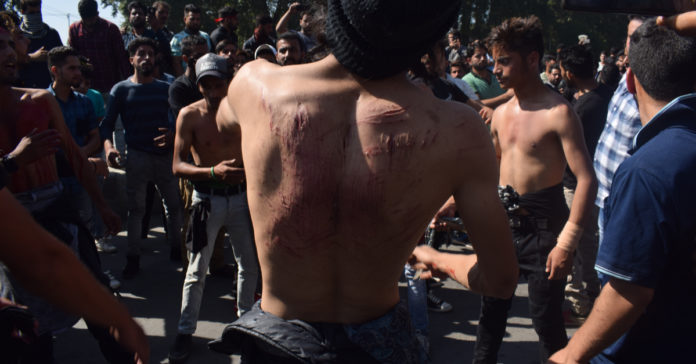The Charity Commission has written to a number of Shia mosques around the country threatening them with regulatory action if they practise Zanjeer Zani (bloodletting with blades) during Muharram.
5Pillars has seen a letter by the Charity Commission addressed to Masjid-e-Ali in Luton to warn them against conducting the practise on their premises.
There is an ongoing dispute over the practise of Zanjeer Zani at the mosque between worshippers but the controversial practise is still taking place there.
We understand that similar letters have been sent out to other Shia centres around the country which allow Zanjeer Zani (also known as Tatbir) to take place on their premises.
The letter from the Charity Commission, reads: “The Commission has a number of regulatory concerns regarding the practice of Zanjeer Zani taking place at any charity’s premises. Charity trustees must comply with their legal duties and responsibilities as charity trustees and the law more generally when managing a charity and as it relates to the activities of their charity.
“Providing activities are not illegal, clearly the Commission respects the rights of individuals to pursue and practice their religion. However, with regards to Zanjeer Zani, the Commission’s regulatory concerns are as follows:
· Safeguarding (both for any children and vulnerable adults present or in the building);
Subscribe to our newsletter and stay updated on the latest news and updates from around the Muslim world!
· Risk of harm/injury to others including the possible transmission of blood borne viruses;
· Possession of offensive weapons;
· Implications for any public liability insurance held by a charity; and
· The health and safety, reputational and public trust issues about the practice taking place at a charity’s premises.
“Whilst there is nothing illegal in this activity being taken place by an individual in private, in light of the issues we raise above, the Commission’s regulatory position is that it is difficult to see how charity trustees can demonstrate that allowing such an activity to take place in and witnessed on charity premises is in the charity’s best interests and does not expose the charity to undue risk.
“Should the practice take place anywhere on the Charity’s premises, the Commission may take regulatory action.”
The Charity Commission has yet to receive a reply from Masjid-e-Ali.
The bloodletting ritual, which is practised by only a minority of Shias worldwide, has in recent decades provoked heated debate among Shia Muslims following its prohibition by Iran’s former leader Ayatollah Khomeini.
Iran’s current leader, Ayatollah Ali Khamenei, has followed suit and those who follow his fatwa say that Zanjeer Zani gives Shias a barbaric image and allows their detractors to criticise them. They say the ritual violates Islam’s prohibition against Muslims intentionally harming their own bodies.
On the other hand, other major Shia scholars advocate Zanjeer Zani or reserve judgement about it, and for those Shias who practise the ritual it is a profound means of expressing grief for the massacre of the Prophet’s grandson, Imam Hussain. They say the bloodletting allows them to feel a little of the sacrifice of the battle of Karbala on the Day of Ashura, during which Imam Hussain was martyred.






















